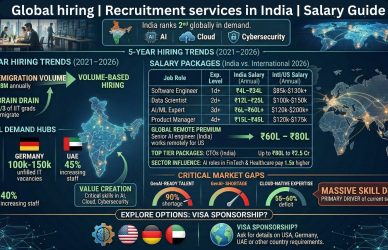Introduction
In today’s dynamic business environment, efficient payroll services have emerged as a cornerstone of successful organizational management. These services, which encompass the process of compensating employees for their work, are not just administrative tasks but strategic elements that significantly influence a company’s operations and its workforce morale. This introduction aims to provide a brief overview of the importance of efficient Payroll Services for USA Companies and their impact on employee satisfaction and legal compliance.
Importance of Efficient Payroll Services
Efficient payroll services are critical for several reasons. Firstly, they ensure that employees are paid accurately and on time, which is fundamental to maintaining their trust and motivation. An efficient payroll system minimizes errors in wage calculations and deductions, thereby reducing the risk of financial discrepancies. Moreover, it streamlines the payroll process, making it more manageable for the HR and finance departments, which in turn can focus on more strategic tasks. An effective payroll system also aids in financial planning and analysis, providing insights into labor costs and helping businesses make informed decisions.
Impact on Employee Satisfaction
The direct impact of payroll services on employee satisfaction cannot be overstated. Timely and accurate payment reflects the organization’s respect and value for its employees’ work, enhancing their job satisfaction and loyalty. Furthermore, a transparent and reliable payroll system fosters a positive work environment, encouraging productivity and reducing turnover rates. Employee engagement and morale are significantly boosted when workers are confident in their compensation and benefits management.
Legal Compliance
Efficient Payroll Services for USA Companies play a pivotal role in ensuring legal compliance with federal, state, and local tax laws and labor regulations. Compliance reduces the risk of legal penalties, fines, and reputational damage. An adept payroll system automates tax calculations and withholdings, compliance reporting, and record-keeping, thus mitigating the risk of errors and non-compliance. Moreover, it keeps the company updated on the latest tax laws and labor standards, protecting it from potential legal challenges.

Understanding Payroll Services
Payroll Services are an integral component of any business, ensuring employees are paid accurately and on time while adhering to legal standards. This section delves into the basics of payroll services and underscores the importance of payroll compliance, especially within the United States.
Basics of Payroll Services
Definition and Key Components of Payroll Services:
Definition: Payroll services involve managing the process of paying employees, including calculating wages, withholding taxes, and ensuring the distribution of paychecks.
Key Components: These include gross wages calculation, tax withholdings (federal, state, and local), employee benefits deductions, and net pay calculation. Accurate record-keeping and timely tax filings are also pivotal.
The Role of Payroll Services in a Business Ecosystem:
Employee Satisfaction: Prompt and correct payment boosts morale and trust in the company.
Financial Management: Helps in budgeting and financial planning by providing clear insights into the largest expense for most businesses—payroll.
Regulatory Compliance: Ensures adherence to tax laws and employment regulations, mitigating legal risks.
Importance of Payroll Compliance
Overview of Payroll Compliance Requirements in the USA:
Federal Requirements: Include withholding income tax, Social Security, and Medicare taxes. Employers must also comply with the Federal Unemployment Tax Act (FUTA).
State and Local Requirements: Can vary significantly, covering state income taxes, unemployment insurance, and specific local tax levies.
Reporting and Record-Keeping: The Fair Labor Standards Act (FLSA) mandates record-keeping of employees’ pay and hours worked, alongside regular reporting to tax authorities.
Consequences of Non-Compliance for Businesses:
Financial Penalties: Fines and penalties for late or incorrect tax filings can be substantial.
Legal Repercussions: Non-compliance can lead to audits, lawsuits, or even criminal charges in severe cases.
Reputational Damage: Legal issues and unfair payroll practices can tarnish a company’s reputation, affecting customer trust and employee morale.
Operational Disruptions: Dealing with compliance issues can distract from core business activities, impacting productivity and growth.

Choosing the Right Payroll Service Provider
Selecting the appropriate payroll service provider is crucial for businesses of all sizes. This choice impacts not only the efficiency of payroll processing but also compliance with complex tax laws and regulations. This detailed exploration covers the types of payroll providers and key features to consider, ensuring businesses make an informed decision tailored to their needs.
Types of Payroll Providers
Payroll Services for USA Companies vary significantly in complexity and features offered, catering to diverse business requirements. Understanding these differences is key to choosing the right provider.
DIY Payroll Software vs. Full-Service Payroll Providers:
DIY Payroll Software: These platforms offer tools for businesses to manage payroll in-house with minimal external support. They are suitable for small businesses with simpler payroll needs and those looking to maintain hands-on control over payroll processes.
Features and Benefits: Cost-effectiveness; customizable reports; integration with existing HR systems. However, they require a higher time investment and a good understanding of payroll regulations.
Full-Service Payroll Providers: Offer comprehensive payroll services, including tax filing, compliance management, and often human resources support. Ideal for businesses lacking the expertise or resources to manage payroll internally.
Features and Benefits: Ease of use; expert support for tax and compliance issues; scalable services as the company grows. More expensive, but significantly reduces the time and effort required from the business.
Features and Benefits for Different Sizes of Companies:
Small Businesses: Often benefit from DIY software due to lower costs and simpler payroll needs.
Medium to Large Businesses: Generally prefer full-service providers for their scalability and ability to handle complex payroll and tax scenarios.
Key Features to Look for in a Payroll Service
Choosing a payroll service provider should be based on more than just cost. Here are essential features to consider:
Automation and Integration Capabilities:
Look for services that offer automation of repetitive tasks like payroll calculations and the distribution of paychecks. Integration with existing HR systems and accounting software streamlines processes and reduces manual data entry errors.
Tax Filing and Compliance Support:
A critical feature of full-service payroll providers is their support for tax filing and maintaining compliance with local, state, and federal regulations. This includes automatic tax calculation, deductions, and filings, as well as staying up-to-date with changes in laws to avoid penalties.
Security Features and Data Protection:
Payroll involves handling sensitive employee data, including Social Security numbers and banking information. A reliable payroll service must have robust security measures, such as encryption and two-factor authentication, to protect this data from breaches.

Benefits of Outsourcing Payroll Services
Outsourcing Payroll Services for USA Companies offers myriad advantages to businesses, ranging from small enterprises to large corporations. This strategic decision not only enhances operational efficiency but also significantly reduces the risk of compliance errors. Here, we delve into the critical benefits of outsourcing payroll services, focusing on time and cost savings, as well as enhanced compliance and accuracy.
Time and Cost Savings
Reduction in Internal Workload: Outsourcing Payroll Services for USA Companies offloads a significant burden from internal teams, allowing them to focus on core business activities. It eliminates the need for them to keep up with complex payroll regulations and time-consuming tasks such as data entry, calculation of paychecks, and tax withholdings.
Operational Cost Reduction:
Direct Savings: By outsourcing, companies can save on the costs associated with payroll software subscriptions, training, and maintenance. There’s no need to invest in specialized payroll software or to continually update systems in accordance with changing regulations.
Indirect Savings: Reducing the likelihood of errors minimizes the risk of penalties for non-compliance, which can be substantial.
Case Study/Example: A small business with 50 employees might spend significant resources in-house on payroll management, including software costs, employee training, and the risk of non-compliance penalties. By outsourcing, this business could reduce its payroll-related expenses by up to 30%, according to a report by the National Business Association, reflecting savings on software, staff time, and avoidance of penalties.
Enhanced Compliance and Accuracy
Minimization of Errors: Professional payroll providers are experts in their field, equipped with the latest technology and up-to-date information on payroll legislation. This expertise significantly reduces the risk of errors in tax calculations and payroll processing, ensuring employees are paid correctly and on time.
Ensuring Compliance:
Keeping Up with Legislation: Payroll providers stay abreast of changing tax laws and employment regulations, ensuring that businesses comply with all legal requirements. This is particularly beneficial for companies operating in multiple jurisdictions, where laws can vary significantly.
Audit Support: In the event of an audit or an inquiry from tax authorities, having an outsourced payroll provider means access to detailed records and expert advice. This support can prove invaluable in navigating the audit process successfully.
Role of Expert Advice: Payroll services often offer access to expert advice on a range of issues beyond payroll, such as employee benefits, tax-saving opportunities, and compliance with new laws. This advice can help businesses make informed decisions, further enhancing operational efficiency and legal compliance.

Implementing a Payroll Service Solution
Transitioning to a new payroll provider is a strategic move that can significantly enhance the efficiency and accuracy of payroll management within a company. However, the process requires careful planning and execution to ensure a smooth transition and successful integration with existing systems. This comprehensive guide outlines the steps for transitioning to a new payroll provider and addresses the challenges and solutions for integrating new payroll services with current HR and accounting systems.
Steps to Transition to a New Payroll Provider
Preparing Your Business for Transition:
Audit Current Payroll Processes: Evaluate your current payroll processes to identify inefficiencies or areas for improvement. This assessment will inform your requirements for a new provider.
Involve Key Stakeholders: Engage with stakeholders from HR, finance, and other relevant departments early in the process. Their input is crucial for selecting a provider that meets the diverse needs of your business.
Data Cleanup: Ensure employee data is accurate and up-to-date. Correct any discrepancies in employee details, pay rates, and tax information before migration to avoid errors.
Selecting and Setting Up Your New Payroll Service:
Define Your Requirements: List essential features and functionalities based on your business needs, such as tax compliance support, reporting capabilities, and scalability.
Research and Select a Provider: Consider providers that offer the specific features and support your business requires. Look for reviews, ask for referrals, and request demos to make an informed decision.
Setup and Training: Once selected, work closely with the provider to set up your new payroll system. Ensure comprehensive training for your team to maximize the system’s benefits.
Integration with Existing Systems
Integrating a new payroll service with existing HR and accounting systems is vital for maintaining data consistency and operational efficiency. However, this process can present challenges.
Challenges and Solutions for Integration:
Compatibility Issues: The new payroll system may not be immediately compatible with your existing software. Solution: Look for a payroll provider that offers customizable integration options or consider middleware solutions that can bridge the gap between different systems.
Data Synchronization: Ensuring real-time or timely data exchange between systems can be challenging. Solution: Implement automated data synchronization where possible and establish regular checks to maintain data accuracy.
Training and Adaptation: Employees may resist changing to a new system due to familiarity with the old one. Solution: Provide comprehensive training and highlight the benefits of the new system to encourage adaptation.
Importance of Seamless Integration:
Data Consistency and Accuracy: Integration ensures that changes in one system, such as employee information updates, are reflected across all platforms, reducing the risk of errors.
Efficiency: Automated data exchange eliminates the need for manual data entry, saving time and reducing the likelihood of mistakes.
Strategic Decision Making: Integrated systems provide a holistic view of payroll, HR, and financial data, supporting informed decision-making and strategic planning.

Trends and Innovations in Payroll Services
The Payroll Services industry is undergoing rapid transformation, driven by technological advances and shifting global workforce trends. These changes are not only making payroll processes more efficient but also opening up new possibilities for businesses to manage their workforce. This exploration delves into the technological advances within payroll processing and forecasts the future of payroll services, highlighting upcoming features and the impact of global workforce trends.
Technological Advances in Payroll Processing
Changing Landscape of Payroll Services:
Automation: The adoption of automation in payroll processing has significantly reduced the time and effort required for data entry and calculations, minimizing errors and improving efficiency.
Cloud Computing: Cloud-based payroll solutions offer scalability, flexibility, and remote access, enabling businesses to manage payroll from anywhere, at any time.
The Rise of AI and Machine Learning in Payroll Processing:
Predictive Analytics: AI and machine learning are being used to predict future payroll costs and trends, aiding in more accurate budgeting and financial planning.
Personalized Employee Experiences: AI is enabling more personalized payroll services, such as tailored benefits administration and automated responses to employee queries.
Fraud Detection: Advanced algorithms can identify patterns indicative of fraudulent activity, enhancing the security of payroll processes.
The Future of Payroll Services
Predictions for New Features and Capabilities:
Real-Time Payroll: The future may see the rise of real-time payroll processing, where employees can be paid almost immediately for their work, improving financial flexibility for the workforce.
Integration with Gig Economy Platforms: As the gig economy grows, payroll services may develop deeper integrations with gig economy platforms to streamline payments to freelancers and contract workers.
Potential Impact of Global Workforce Trends on Payroll Services:
Remote and Global Workforces: The increasing prevalence of remote and global workforces will require payroll services to manage multiple currencies, tax laws, and compliance regulations across jurisdictions.
Employee Wellness Programs: There’s a growing trend towards incorporating wellness and financial health programs into payroll services, offering employees access to services like early wage access, savings programs, and financial advice.
Environmental, Social, and Governance (ESG) Reporting: Payroll services may start to include features that help businesses track and report on ESG criteria, reflecting the growing importance of corporate social responsibility.

Conclusion
Selecting the right payroll service provider is a critical decision that can significantly influence the operational efficiency, compliance, and overall satisfaction levels within a business. As we’ve explored, the landscape of payroll services is rapidly evolving, with technological innovations such as AI, machine learning, and cloud computing transforming traditional payroll processes. These advancements are not just about keeping up with compliance or streamlining operations; they are about leveraging payroll as a strategic asset that can contribute to a business’s success.
Investing in the right Payroll Services for USA Companies is, therefore, more than an operational necessity—it’s a strategic decision that can enhance employee satisfaction, ensure adherence to ever-changing tax laws and regulations, and provide valuable insights into financial planning and resource allocation. Businesses that recognize the value of advanced payroll solutions are better positioned to attract and retain talent, mitigate risks associated with non-compliance, and achieve greater operational efficiencies.
In this dynamic business environment, the encouragement to invest in sophisticated Payroll Services for USA Companies goes beyond mere recommendation—it’s a call to action for businesses aiming for growth, resilience, and long-term success. By choosing a provider that aligns with your business s needs and embraces the latest technological trends, you can transform your payroll processes into a cornerstone of business strategy and success. MME is one of the best Payroll service providers in India for US Companies.

Call to Action
It’s time to take a closer look at your current payroll system. Is it meeting your business needs efficiently, or are there gaps that could be filled by newer, more advanced solutions? Upgrading or switching to a professional payroll service provider can revolutionize how you manage payroll, ensuring accuracy, compliance, and employee satisfaction. The benefits of leveraging the latest technologies and expertise in payroll services are clear—improved operational efficiency, enhanced security, and better financial planning. Don’t let outdated processes hold your business back. Consider the advantages of a professional payroll service today and take the first step towards a more streamlined, secure, and successful future.




